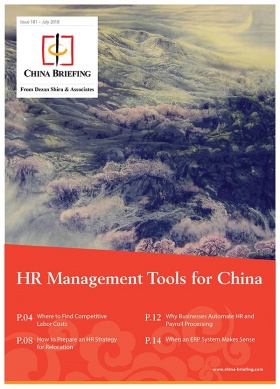China Ranks 46th in Ease of Doing Business Rankings
Ease of doing business in China received some validation as the World Bank’s newly released rankings showed the country rise by 32 spots.
According to the report, which was released on October 31, China leaped from 78th to 46th place, showing that it had made dramatic improvements to its business environment over the past year.
China’s gains were the third-most high out of the 190 economies ranked, trailing only behind Afghanistan and Djibouti in terms of year-on-year improvements.
The change is even more striking as China had stagnated in the rankings for much of the last decade. In 2008, China ranked 86 for ease of doing business, improving only marginally to 78 in both 2016 and 2017. In between, in 2012, China was ranked as low as 99.
The strong performance is a result of a concerted campaign by China’s central government to streamline the country’s bureaucracy and create a more attractive environment for establishing a business.
Big reform wins: Ease of doing business report
Establishing a business is one of the key areas that China has made improvements, according to the report. The World Bank ranked China 28 out of 190 economies for starting a business – a huge improvement from 93 just last year.
China dramatically reduced the days needed for starting a company from 22.9 days to nine by cutting the number of procedures needed to start a business from seven to four and slashing other bureaucratic red tape. Now, China ranks similarly to OECD countries for the number of days required to set up a business.
The completion of the five-in-one business license reform and the introduction of policies like “One Window, One Form”, which created a simplified digital channel to register a business, have contributed to China’s improvements in this area.
Another huge improvement was in getting electricity. China jumped from 98 to 14 in this area through initiatives like expanding network capacity, cutting costs, and simplifying administration by introducing a mobile application.
China also made leaps in dealing with construction permits, moving from 172 – one of the lowest marks in the world – to 121. Although China still lags in this area, the 51-spot shift upwards is a welcome sign of progress. To accomplish this, China simplified and shortened construction approval processes and also strengthened transparency standards.
In addition to these areas, China improved in registering property (moving from 41 to 27), protecting minority investors (119 to 64), and trading across borders (97 to 65).
Doing business in China: Looking beyond the rankings
Although China made great improvements over the past year to improve its business environment, certain areas continue to lag.
China’s modest improvements in ease of paying taxes, moving from 130 to 114, is somewhat disappointing given the completion of the business tax (BT) to value-added tax (VAT) reform and the further simplification of the VAT system. Nevertheless, China is still making progress in this regard, though its tax system remains complex overall.
An important caveat to the World Bank’s ease of doing business rankings for China is that they were measured based on the business environments in Beijing and Shanghai – two of China’s wealthiest cities and both directly controlled by the central government.
The interpretation and implementation of policies in China can vary widely based on region, and a foreign investor might find that the business environment in a smaller provincial city is significantly different – and less accessible – than in Beijing and Shanghai.
It is also worth noting that while China has greatly improved in the ease of doing business rankings, foreign business sentiment has soured considerably. For example, a survey conducted earlier this year by the American Chamber of Commerce found that an overwhelming 75 percent of surveyed businesses felt less welcome in China than before.
Further, the deepening US-China trade war has brought to surface many of the frustrations foreign businesses feel in China, such as preferential treatment given to Chinese and state-owned companies and rampant intellectual property violations.
Nevertheless, while doing business in China continues to be a challenging prospect, the country’s tangible improvements in its business environment can only be seen as a positive for foreign businesses.
About Us
China Briefing is produced by Dezan Shira & Associates. The firm assists foreign investors throughout Asia and maintains offices in China, Hong Kong, Indonesia, Singapore, Russia, and Vietnam. Please contact info@dezshira.com or visit our website at www.dezshira.com.
- Previous Article China’s IIT Reform: Seven Key Points from the Draft Implementation Rules
- Next Article China-Singapore FTA: Upgrade Deal Reached








